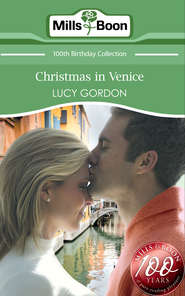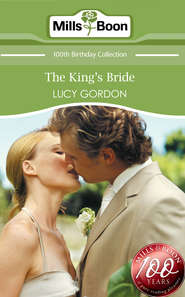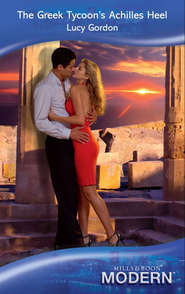По всем вопросам обращайтесь на: info@litportal.ru
(©) 2003-2024.
✖
The Italian's Baby
Автор
Год написания книги
2018
Настройки чтения
Размер шрифта
Высота строк
Поля
THE words stood out starkly, black against the white paper.
A boy. Born yesterday. 8lbs 6oz.
A simple message that might have been the bringer of joy. But to Luca Montese it meant that his wife had given a son to another man, and none to him. It meant that the world would know of his humiliation, and that made him curse until there was nobody left to curse, except himself, for being a blind fool. His face was not pleasant at that moment. It was cruel and frightening.
Fear of that face had made Drusilla leave him as soon as she knew she was pregnant, six months ago. He had arrived home to find her gone, leaving him a note. It had said that there was another man. She was pregnant. It was no use trying to find her. That was all.
She had taken everything he had ever given her, down to the last diamond, the last stitch of couture clothing. He’d pursued her like an avenging fury, not in person but through a battery of expensive lawyers, nailing her down to a divorce settlement that left her nothing beyond what she had already taken.
It galled him that the man was so poor and insignificant as to be virtually beyond the reach of his revenge. If he had been a rich entrepreneur, like himself, it would have been a pleasure to ruin him. But a hairdresser! That was the final insult.
Now they had a big, lusty son. And Luca Montese was childless. The world would know that it was his fault that his marriage had been barren, and the world would laugh. The thought almost drove him to madness.
Three floors below him was the heart of Rome’s financial district, a world he had made his own by shrewdness, cunning and sheer brute muscle. His employees were in awe of him, his rivals were afraid of him. That was how he liked it. But now they would laugh.
He turned the paper between his fingers. His hands were heavy and strong, the hands of a workman, not an international financier.
His face was the same; blunt-featured, with a heaviness about it that had little to do with the shape of features, and more to do with a glowering intensity in his eyes. That, and his tall, broad-shouldered body, attracted the kind of woman—and there were plenty of them—who gravitated towards power. Physical power. Financial power. All kinds. Since the break-up of his marriage he hadn’t lacked company.
He treated them well, according to his lights, was generous with gifts but not with words or feelings, and broke with them abruptly when he realised they did not have what he was seeking.
He could not have said what that was. He only knew that he’d found it once, long ago, with a girl who had shining eyes and a great heart.
He barely remembered the boy he’d been then, full of impractical ideas about love lasting forever. Not cynical, not grasping, believing that love and life were both good: a foolishness that had been cruelly cured.
He brought himself firmly back to the present. Dwelling on lost happiness was a weakness, and he always cut out weakness as ruthlessly as he did everything else. He strode out of the office and down to the underground parking lot, where his Rolls-Royce—this year’s model—was waiting.
He had a chauffeur but he loved driving it himself. It was his personal trophy, the proof of how far he’d come since the days when he’d had to make do with an old jalopy that would have collapsed if he hadn’t repaired it himself.
Even with his best efforts it was liable to break down at odd moments, and then she would laugh and chatter as she handed him spanners. Sometimes she would get under the car with him, and they would kiss and laugh like mad things.
And perhaps it was a kind of madness, he thought as he headed the Rolls out of Rome to his villa in the country. Mad, because that heart-stopping joy could never last. And it hadn’t.
He’d brushed the thought of her aside once, but now she seemed to be there beside him as he drove on in the darkness, tormenting him with memories of how enchanting she had been, with her sweet gentleness, her tenderness, her endless giving. He had been twenty, and she seventeen, and they’d thought it would last forever.
Perhaps it might have done if—
He shut off that thought too. Strong man though he was, the ‘what if?’ was unbearable.
But her ghost wouldn’t be banished. It whispered sadly that their brief love had been perfect, even though it had ended in heartbreak. She reminded him of other things too, how she’d lain in his arms, whispering words of love and passion.
‘I’m yours, always—always—I shall never love any other man—’
‘I have nothing to offer you—’
‘If you give me your love, that’s all I ask.’
‘But I’m a poor man.’
How she had laughed at that, ripples of young, confident laughter that had filled his soul. ‘We’re not poor—as long as we have each other…’
And then it was over, and they no longer had each other.
Suddenly there was a squeal of tyres and the wheel spun in his hand. He didn’t know what had happened, except that the car had stopped and he was shaking.
He got out to clear his head, looking up and down the country road. It was empty in both directions.
Like his life, he thought. Coming out of the empty darkness and leading ahead into empty darkness.
It had been that way for fifteen years.
The Allingham was the newest, most luxurious hotel to have gone up in London’s exclusive Mayfair. Its service was the best, its prices the highest.
Rebecca Hanley had been appointed its first PR consultant partly because, as the chairman of the board had said, ‘She looks as if she grew up with money to burn, and didn’t give a damn. And that’s useful when you’re trying to get people to burn money without giving a damn.’
Which was astute of him, because Rebecca’s father had been a very rich man indeed. And these days she didn’t give a damn about anything.
She lived in the Allingham, because it was simpler than having a home of her own. She used the hotel’s beauty salon and gymnasium, and the result was a figure that wasn’t an ounce overweight, and a face that was a mask of perfection.
Tonight she was putting the final touches to her appearance when the phone rang. It was Danvers Jordan, the banker who was her current escort.
They were to attend the engagement party of his younger brother, held in the Allingham. As Danvers’ companion and a representative of the hotel, she would be ‘on duty’ in two ways, and must look right, down to every detail.
As she checked herself in three angled mirrors Rebecca knew that nobody could fault her looks. She had the slim, elegant body that could wear the tight black dress, and the endless legs demanded by the short skirt. The neckline was low-cut, but within relatively modest limits. Around her neck she wore one large diamond.
Her hair had started life as light brown, but now it was a soft honey-blonde that struck a strange, distinctive note with her green eyes. Small diamonds in her ears added the final touch.
On exactly the stroke of eight the knock came on her door and she sauntered gracefully across to let Danvers in.
‘You look glorious,’ he said, as he always did. ‘I shall be the proudest man there.’
Proudest. Not happiest.
The party was in a banqueting room, hung with drapes of white silk interspersed with masses of white roses. The engaged couple were little more than children, Rory twenty-four, Elspeth eighteen. Elspeth’s father was the president of the merchant bank for which Danvers worked, and which was part of the consortium that had financed the Allingham.
She was like a kitten, Rebecca thought, sweet, innocent and intense about everything, especially being in love.
‘I didn’t think people talked about “forever and ever” any more,’ she said to Danvers when the evening was half over.
‘I suppose if you’re young enough and stupid enough it seems to make sense,’ he said wryly.
‘Do you really have to be young and stupid?’
‘Come on, darling! Grown-ups know that things happen, life goes wrong.’
‘That’s true,’ she said quietly.
Elspeth came flying up to them, throwing her arms around Rebecca.











